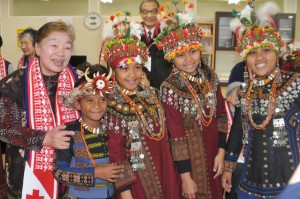台湾から日本への災害援助は20億円に達し、2011年3月11日以降、米国や被災地に差しのべられた数々の公的・私的資金援助をしのぎ、この小さな島(台湾)は最大の援助国となった。台湾人たちはその貢献を誇りに思っている。
長年日本に住む台湾人ジャーナリスト、エイミー・ホワンは、このあふれんばかりの支援は二つの目的から成ると語る。
「まず第一に、過去に台湾が自然災害で打撃を受けた時に、台湾への支援の先頭にたってくれた日本に対しお返しをする責務があると、政府も国民も考えていることです。もうひとつは、困難に遭っている他者を助けることは大切なことだということが、人びとの間に信念として根付いていることです」。
 実際のところ、日本で巨大地震が起き、東北沿岸を津波が襲ってからすぐに、台湾政界のリーダーたちは首相と首相夫人を先頭に多くの募金キャンペーンに参加した。彼らは破壊された地域へのお見舞いと連帯を表明し、国民たちからの支援の要請に応えたのだった。街頭募金や寄付金キャンペーン会場では、多くの人が寄附をおこなった。台湾赤十字には義捐金が殺到し、日本を支援するボランティアが押し寄せた。
実際のところ、日本で巨大地震が起き、東北沿岸を津波が襲ってからすぐに、台湾政界のリーダーたちは首相と首相夫人を先頭に多くの募金キャンペーンに参加した。彼らは破壊された地域へのお見舞いと連帯を表明し、国民たちからの支援の要請に応えたのだった。街頭募金や寄付金キャンペーン会場では、多くの人が寄附をおこなった。台湾赤十字には義捐金が殺到し、日本を支援するボランティアが押し寄せた。
「台湾の支援の多くは、学校や道路や病院などのインフラ補強にあてられました。失われたインフラ設備を再建するということは、その地域にコミュニティを再生させたいという願いにつながるのです」とホワンは説明する。
東北地方では、ちりぢりになったコミュニティが故郷に戻ることを切に願っているが、人びとの家がなければ不可能だ。地方自治体は、再生の鍵でもある、人びとが移動するのを何とか押しとどめようとしている。台湾人寄贈者たちは、このような目的の支援に使って欲しいと願っていた。他の寄附は、災害直後の緊急物資として提供されたうえに、台湾と日本の間で企業間の提携をも生み出し、すべてを失った人びとに製品や物資を提供するという支援にまでつながった。台湾メディアもまた放射能汚染地域と安全圏とを区別することに注意を払いながら被災地からレポートをおこなった。というのも、台湾からの観光客がパニックを起こさないためである。海外から日本を訪れる人のうち、台湾人観光客が、大きな割合を占めている。
一年を過ぎてもまだ、日本に支援訪れる多くの台湾人ボランティアがいる。彼らは一人暮らしや友達を必要とする家族や高齢者のために一緒過ごしながら仮設住宅で支援を行なっている。学生たちは、学校が休みの間、仮設住宅で思いやりや気遣いをもって支援をするために、東北地方を訪れることを続けている。
ホワンは、コミュニティの役割分担という意識が、台湾文化に深く浸透しているという。熱帯低気圧や地震に見舞われがちな島では、災害に備え早期の警報を出すことが、政府の主要な政策である。災害が襲った時、その地域の人びとは互いに助け合い、他人に寛大な心で応じるのは当たり前のことなのだ。
「台湾人にとって、これは伝統であり、日本に援助の手を差し伸べるのは自然なことなのです。寄附とは単にお金を与えることだけではなく、お金が確実に相手に届き、人びとを元気づけるということなのです。困難に直面している人びとには自発的に与え、できるだけ早く相手を助けようとする目的が重要なのです。結果はあとからついてくるのです」。
スベンドリニ・カクチ
Disaster aid to Japan from Taiwan has topped Yen 20 billion making the small island the biggest country donor, overtaking the United States and the other large number of official and private donations that have extended funds to the affected areas after March 11. 2011. And the Taiwanese are proud of their contributions.
Amy Huang, a Taiwanese journalist living in Japan for many years says this outpouring of support is based on two purposes.
“The first,” she explained, “ is the strong commitment in the government and by the public to repay Japan that has been at the forefront of assisting Taiwan when it was struck by natural disasters in the past. The other reason stems from a deep rooted belief among the people that it is important to help others who are in distress.”
Indeed, Taiwanese political leaders led by the Prime Minister and the First Lady participated in many donation campaigns immediately after the massive earthquake and tsunami hit the northeast coasts of Japan. They expressed their sympathy and solidarity for the devastated communities and requested help from the public. The money poured in from people on the streets and other events where collection campaigns were held. The Taiwan Red Cross was inundated with cash contributions and Taiwanese volunteers flooded to Japan to help out.
Huang explained that most of Taiwanese aid has supported the re-enforcement of damaged infrastructure such as re- build schools, roads and hospitals. “The rebuilding of lost facilities are important as this will lead to bringing communities back to the areas,” she explained.
The scattered communities in Tohoku are eager to return home but cannot do so without their homes. Local governments are struggling to retain the displaced populations which is a key to recovery. Aid used for that purpose will be greatly appreciated by the Taiwanese donors. Other donations have provided emergency goods soon after the disaster and also created tie-ups between Taiwanese and Japanese companies that continue to extend help such as providing products and goods for the people who have lost everything. The Taiwanese media have also reported from the disaster areas taking care to make a difference between radioactive contaminated areas and safer zones so as not to cause panic for tourists from their country. Taiwanese tourism comprise a large proportion of overseas visitors to Japan.
One year later there are still many Taiwanese volunteers who visiting Japan to help at temporary shelters either by spending time visiting the families and old people who now live alone and need friends . Students continue to visit Tohoku during the school holidays providing their friendly and caring visits at temporary shelters.
Hunag said community sharing is deeply ingrained in Taiwanese culture. The island is prone to natural cyclones and earthquakes and disaster preparation and early warning remain a key government policy. When disaster strikes, it is common that the local people help each other and others respond generously.
“That is the tradition and reaching out to help Japan is something natural for the Taiwanese. Donations are not extended only the givers of the money can be reassured the money is will definitely reach the people. Giving to people in trouble is spontaneous and for the more important purpose of helping others as quickly as possible. The results can come later,” she said.
Suvendrini Kakuchi
